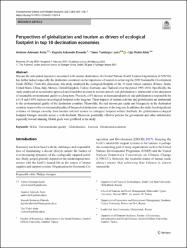Perspectives of globalization and tourism as drivers of ecological footprint in top 10 destination economies
Özet
Beyond the anticipated experience associated with tourism destinations, the United Nations World Tourism Organization (UNWTO)
has further tasked (especially the destination countries) on the importance of tourism to achieving the 2030 Sustainable Development
Goals (SDGs). From this dimension, this study employed the ecological footprint of the 10 most visited countries (France, Spain,
United States, China, Italy, Mexico, United Kingdom, Turkey, Germany, and Thailand) over the period 1995–2016. Specifically, the
study employed an econometric approach and found that increase in tourism arrivals and globalization is detrimental to the attainment
of sustainable environmental quality in a long term. Precisely, a 1% increase in international arrivals and globalization is responsible for
a 0.18 and 0.89% increase in ecological footprint in the long-run. These impacts of tourism activities and globalization are detrimental
to the environmental quality of the destination countries. Meanwhile, the real income per capita and biocapacity in the destination
countries improve the environmental quality of the panel of destination countries in the long-run. In addition, the study found significant
evidence of Granger causality from tourism and real income to ecological footprint without feedback, the globalization-ecological
footprint Granger causality nexus is with feedback. Moreover, potentially effective policies for government and other stakeholders
especially toward attaining Global goals were proffered in the study.
Cilt
28Sayı
24Bağlantı
https://hdl.handle.net/11363/4945Koleksiyonlar
Aşağıdaki lisans dosyası bu öğe ile ilişkilidir:


















